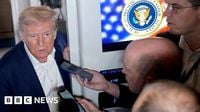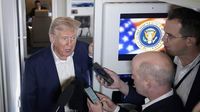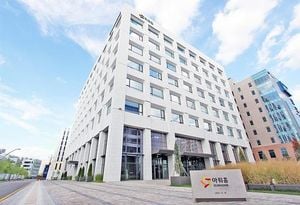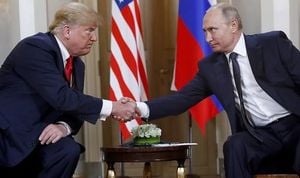In a significant policy shift, the Trump administration has exempted smartphones, computers, and various electronic devices from its steep "reciprocal" tariffs on Chinese imports. This decision, announced by the U.S. Customs and Border Protection (CBP) late on Friday, April 11, 2025, comes as a relief to tech companies and consumers alike, as the tariffs had threatened to substantially increase prices on popular gadgets.
The exemptions, which are retroactive to April 5, 2025, cover a wide range of electronic goods, including smartphones, computer monitors, and components such as semiconductors and memory chips. These products were previously subject to a staggering 145% tariff on imports from China, which included a 125% levy recently imposed by President Trump and an additional 20% tariff related to China's alleged role in the fentanyl crisis.
According to analysts, this move is a "game-changer scenario" for the tech industry. Dan Ives, the global head of technology research at Wedbush Securities, stated, "This is the dream scenario for tech investors. Smartphones, chips being excluded is a game-changer scenario when it comes to China tariffs." He emphasized that major tech firms, including Apple, Nvidia, and Microsoft, can now breathe a sigh of relief, as the exemption will help stabilize prices and production costs.
Trump's administration indicated that these exemptions were designed to give companies more time to relocate production to the United States. White House Press Secretary Karoline Leavitt explained, "President Trump has made it clear America cannot rely on China to manufacture critical technologies such as semiconductors, chips, smartphones, and laptops. At the direction of the president, these companies are hustling to onshore their manufacturing in the United States as soon as possible." This statement highlights a broader strategy to reduce dependency on Chinese manufacturing and enhance domestic production capabilities.
Despite the exemptions, the 20% tariff on Chinese goods related to fentanyl remains in effect. This dual approach aims to address both trade imbalances and public health concerns associated with opioid distribution. Analysts warn, however, that the overall economic impact of tariffs could still be felt by consumers. Some estimates suggested that without these exemptions, iPhone prices in the U.S. could have tripled if costs were passed on to consumers.
Counterpoint Research noted that Apple accounted for more than half of smartphone sales in the U.S. last year, with approximately 80% of its iPhones intended for the U.S. market manufactured in China. The company has been actively seeking to diversify its supply chains, with India and Vietnam emerging as potential alternatives for production hubs.
In a related development, Nintendo announced on April 4, 2025, that it would postpone the U.S. preorder date for its Switch 2 gaming console to assess the potential impact of tariffs and evolving market conditions. Initially priced at $450, experts warned that the console could instead cost around $600 due to the tariffs.
Trump's recent tariff strategy has been characterized by a mixture of steep levies and temporary pauses. On April 9, 2025, he announced a 90-day pause for tariffs on countries that had not retaliated against U.S. tariffs, while maintaining the higher rates for China. This pause is seen as a negotiating tactic to secure more favorable trade terms from other nations.
While the exemptions provide immediate relief, the long-term implications of Trump's tariff policies remain uncertain. Economists have warned that the tariffs could lead to increased consumer prices and potentially stifle economic growth. As the country grapples with inflation concerns, the administration's decision to exempt certain electronics reflects an awareness of the potential backlash from American consumers.
Trump's tariffs have been a cornerstone of his economic agenda, aimed at addressing what he perceives as unfair trade practices by China. He has often touted the idea that these measures will bring jobs back to the U.S. and reverse a decades-long decline in domestic manufacturing. However, critics argue that many products, particularly electronics, cannot be easily produced in the U.S. due to the high costs associated with domestic manufacturing.
In light of this, the administration is reportedly preparing to launch a national security trade investigation into semiconductor imports, known as a Section 232 study. This could lead to further tariffs on critical components essential for technology production.
Trump's approach to tariffs has drawn mixed reactions from both sides of the political aisle. While some Republican lawmakers support his efforts to protect American industries, others are concerned about the potential negative impact on the economy and consumer prices. As the midterm elections approach, the administration's trade policies will likely continue to be a contentious issue.
As the U.S. navigates this complex trade landscape, the exemptions granted to smartphones and electronics signal a strategic pivot in response to the realities of global supply chains and consumer demand. The administration's efforts to onshore manufacturing and reduce reliance on China will undoubtedly shape the future of the tech industry and its relationship with international markets.






